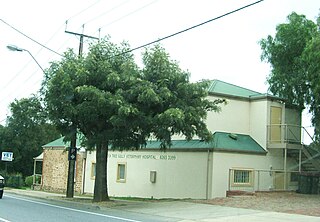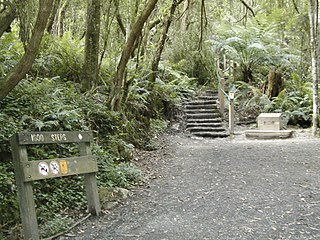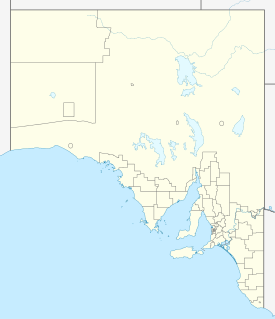
Tea Tree Gully (TTG) is a suburb in the greater Adelaide, South Australia area, under the City of Tea Tree Gully. Tea Tree Gully is in the City of Tea Tree Gully local government area, the South Australian House of Assembly electoral district of Newland and the Australian House of Representatives Division of Makin.

Ferntree Gully is a suburb of Melbourne, Victoria, Australia, at the foothills of the Dandenong Ranges, 30 km South east of Melbourne's Central Business District, located within the City of Knox local government area. Ferntree Gully recorded a population of 26,428 at the 2016 Census.

The Powerhouse Museum is the major branch of the Museum of Applied Arts & Sciences (MAAS) in Sydney, the others being the historic Sydney Observatory at Observatory Hill, and the newer Museums Discovery Centre at Castle Hill. Although often described as a science museum, the Powerhouse has a diverse collection encompassing all sorts of technology including decorative arts, science, communication, transport, costume, furniture, media, computer technology, space technology and steam engines.

Potts Point is a small and densely populated area in inner-city Sydney, New South Wales, Australia. Potts Point is located 2 kilometres east of the Sydney central business district and is part of the local government area of the City of Sydney.

The City of Tea Tree Gully is a local council in the Australian state of South Australia, in the outer north-eastern suburbs of Adelaide. The major business district in the city is at Modbury, where Westfield Tea Tree Plaza, the Civic Centre and the library are located.

Maldon is a town in Victoria, Australia, in the Shire of Mount Alexander local government area. It has been designated "Australia's first notable town" and is notable for its 19th-century appearance, maintained since gold-rush days. At the 2016 census, Maldon had a population of 1,513.

Marble Hill was the Vice-Regal summer residence for the Governor of South Australia for seventy-five years, from 1880 to 1955. It is also the name of a ward of the Adelaide Hills Council, and a suburb, both named after the residence and in which the residence is located. It is about 20 kilometres (12 mi) east of Adelaide between the towns of Ashton and Cherryville, and has expansive views of the Adelaide Hills to the North and East, and the Adelaide Plains to the West.

The Sydney Mint in Sydney, New South Wales, Australia, is the oldest public building in the Sydney central business district. Built between 1811 and 1816 as the southern wing of the Sydney Hospital, it was then known as the Rum Hospital. In 1854 a mint was established on the site with the hospital building used to house mint staff as well as providing a residence for the Deputy Mint Master. A coining factory was built at the rear. Both of these structures have exceptional heritage significance and have been associated with major events in the colonial history of New South Wales.

Hill End is a former gold mining town in New South Wales, Australia. The town is located in the Bathurst Regional Council local Government area.

Shorncliffe is a coastal north-eastern suburb in the City of Brisbane, Queensland, Australia. It is on the shore of Bramble Bay, part of Moreton Bay. In the 2016 census, Shorncliffe had a population of 1,870 people. The suburb attracts visitors to its historic Shorncliffe pier, and Lovers Walk, a walking path along the coastline between Shorncliffe and neighbouring Sandgate.

The Old Mill is a restored tower mill located on Mill Point in South Perth, Western Australia. Today, restored to its original 1830s condition, it is one of Perth's best known historic landmarks and serves as a sightseeing attraction.

A coffee palace was an often large and elaborate residential hotel that did not serve alcohol, most of which were built in Australia in the late 19th century.
Australian non-residential architectural styles are a set of Australian architectural styles that apply to buildings used for purposes other than residence and have been around only since the first colonial government buildings of early European settlement of Australia in 1788.

Anstey Hill Recreation Park is a 362-hectare (890-acre) protected area established in 1989 and located approximately 19 kilometres (12 mi) northeast of Adelaide, South Australia. The park is a significant reserve of bushland in the foothills of the Mount Lofty Ranges and is home to rare or vulnerable native plants and animals, and problematic invasive species. It is managed by the City of Tea Tree Gully, the Department of Environment, Water and Natural Resources and a volunteer group—The Friends of Anstey Hill. The park is designed for recreational walking and has no visitor facilities. It is managed in association with the regional planning initiative known as of Yurrebilla, the Greater Mount Lofty Parklands.

Our Boys Institute (OBI) was a junior branch of YMCA. Opened in 1896, the club was housed in a purpose-built premises at 221 Wakefield Street, Adelaide, South Australia, Australia.

The District Council of Yatala was a local government area of South Australia established in 1853 and abolished in 1868.

Dalveen is a town and a locality in the Southern Downs Region, Queensland, Australia. It borders New South Wales. In the 2016 census, Dalveen had a population of 335 people.

The District Council of Highercombe was a local government area in South Australia from 1853 to 1935.

Tambo Post Office is a heritage-listed former post office and now museum at Arthur Street, Tambo, Blackall-Tambo Region, Queensland, Australia. It was built in 1876 and 1885. It is also known as Post and Telegraph Office Tambo and Tambo Telecommunications Museum. It was added to the Queensland Heritage Register on 21 October 1992.


















